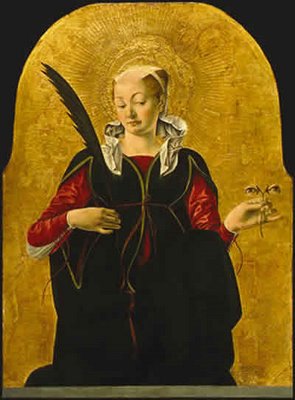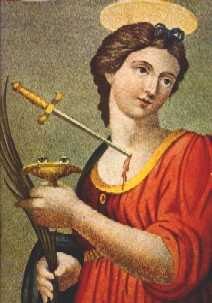 Happy Saint Lucia Day.
Happy Saint Lucia Day.According to Wikipedia, Saint Lucy of Syracuse (b. 283AD) "is one of the very few saints celebrated by the Lutheran Swedes, Finland-Swedes, Danes, and Norwegians, in celebrations that retain many pre-Christian elements of a midwinter light festival."
I've come to realize that Christians were seriously into gore in the martyrdom stories of the saints. I guess it's all kind of exciting in a warped, operatic way. In the case of Saint Lucia, according to the BBC, she "was put to death after suffering various tortures. She was burned alive and came out miraculously unharmed. According to the somewhat fanciful thirteenth-century retelling found in The Golden Legend, despite being stabbed through the neck with a dagger she continued to prophesy the downfall of the governor, the emperor and his co-regent, all of which came to pass after her death. In other versions, Lucy's eyes were torn out and later healed by God, a legend that supports her association with the blind and explains why she is often pictured holding two eyes on a dish." Nice! (And if you think that's bad, you should read about what they did to Agatha...)
Anyway, all that wasn't meant to be the point of this post. The point was meant to be that I've always found the stories I've read about the tradition of Luciadag in Sweden to be sort of quaint and charming. A mid-winter celebration where a girl sticks lighted candles in her hair (how cool -- not to mention dangerous -- is that?) and wakes up her family in the dark early morning with a tray of Lussekatter (a kind of saffron sweet bun).
But my real fondness for the day comes from remembering learning the Luciasång in Prof. Lundell's Swedish class -- ten years ago now, for God's sake! It's the same Neapolitan melody that almost everyone knows, but I find something about it very touching, especially the following line. I think it's the minor key change that gets me all emotional every time...

So, even if you're not munching on Lussekatter, I give you Sankta Lucia, the song, and hope that everyone has a day full of whatever it is that lights you up...
Natten går tunga fjät,
runt gård och stuva.
Kring jord som sol'n förlät,
skuggorna ruva.
Då i vårt mörka hus,
stiger med tända ljus:
Sankta Lucia, Sankta Lucia.
Natten var stor och stum.
Nu hör det svingar,
i alla tysta rum,
sus som av vingar.
Se på vår tröskel står
vitkläd, med ljus i hår:
Sankta Lucia, Sankta Lucia.
 Night stomps with heavy feet
Night stomps with heavy feetThrough farm and steading.
Round the earth, which sun forsakes,
shadows are spreading.
Then on our darkest night,
Comes with her shining light
Sankta Lucia! Sankta Lucia!
The night was huge and still.
Hark! something's stirring!
In all our silent rooms,
Wingbeats are whisp'ring!
See on our threshold there,
White clad, lights in her hair,
Sankta Lucia! Sankta Lucia!

4 comments:
And also with you...
Yeah, the gory saints stories were to the Middle Ages what Hollywood is to us. True story: my sister gave birth coincidentally to her daughter Audrey on the feast day of the English Saint Audrey, known for a nasty goiter that somehow rendered her holy. Ewwww. I mean...alleluia.
This is very bizarre and fabulous at the same time. :)
PS I've moved my site Sufficient Gift to a new address at http://blog.yenfeng.net, just in case you were wondering - Do update my link, thanks!
They grafted a saint onto the holiday, to counteract the obvious pagan and witchcraft associations. Given the nubile blonde at the head of the line, with many virile young men behind her, they clearly failed.
I suspect, based on the history classes I remember, that Lucia was just convenient because lucia in Latin means the light. Also wikipedia has a wee bit on it in Swedish.
I baked instead of going to the gym. Christmas will bring real Lussekatter.
Post a Comment